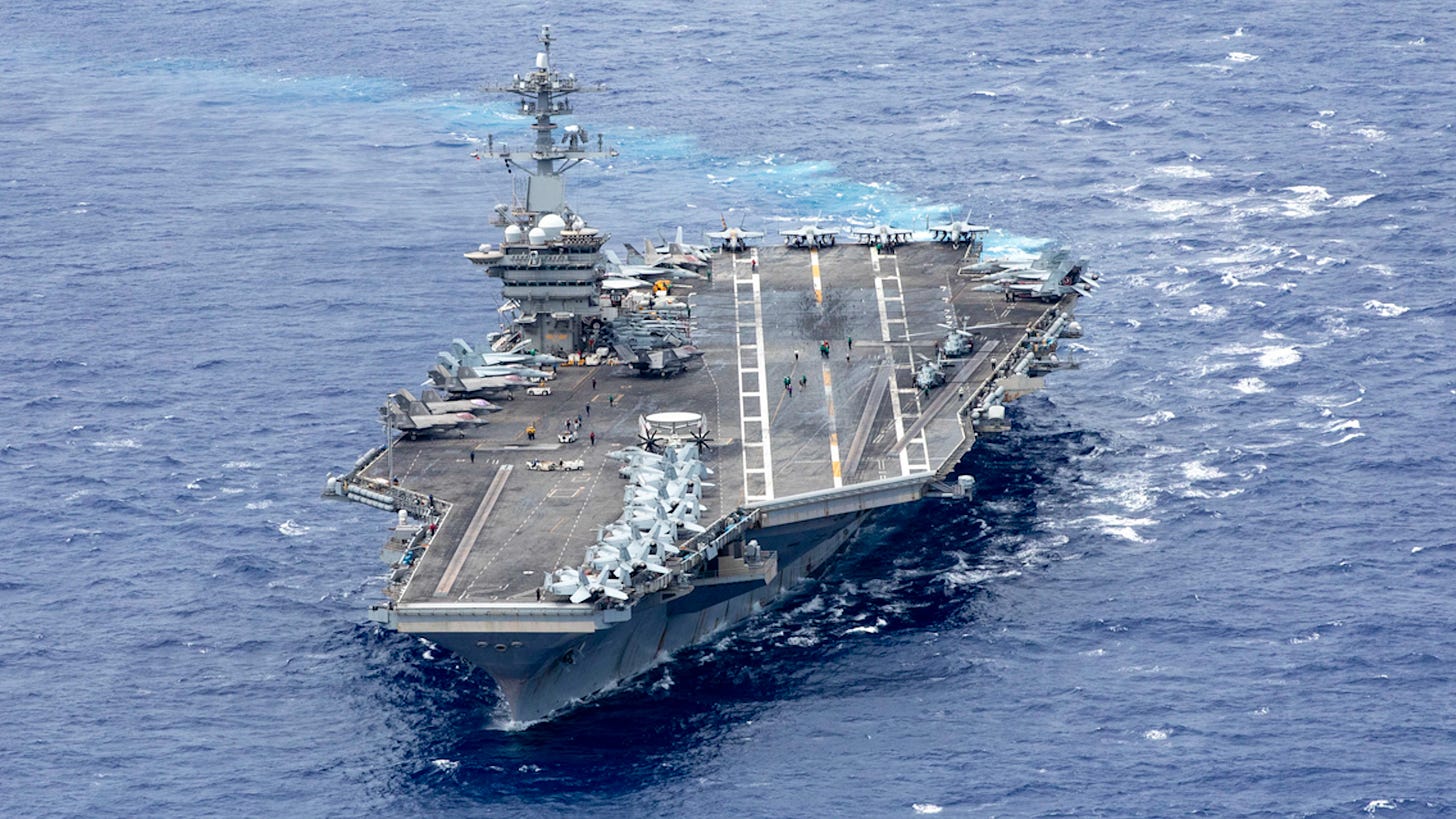Abraham Lincoln in Palestine
The ironies of history.
President Abraham Lincoln never visited Palestine of course. But his namesake, the USS Abraham Lincoln, a Nimitz class aircraft carrier bristling with war-jets and missiles along with a strike force of perhaps seven missile cruisers, destroyers, and other accompanying craft including now a nuclear powered and enabled submarine are all parked off the shores of Palestine and Lebanon on the western edge of Asia or, as we commonly call it, the “Middle East,” just under 6,000 miles from Washington, DC as the crow flies or the dolphin races.
History is full of ironies and I couldn’t help reflecting on Lincoln’s namesake being used to express US global dominance in the eastern Mediterranean Sea.
Entries in this blog are intentially brief, so I won’t go into a long dissertation about foreign interventionism, the surrender of Congress’ war-making powers to the Executive, or the morality or amorality of the wars now in progress — for make no mistake, they are wars — in the Levant and nearby Ukraine.
Instead, here is an excerpt from a letter written by Abraham Lincoln perhaps thirteen years before his election to the presidency gave the proximate excuse for seccession by the Slave Power of the South and the outbreak of the Civil War. The irony, it seems to me, is to have Lincolns namesake as the spearhead of American dominance in the border wars of the region.
The context of the letter is the Mexican-American War of 1846-1848. That war will reward your study. Many Americans opposed it. Lincold did. General U.S. Grant later wrote in his eminently readable memoir “For myself, I was bitterly opposed to the measure, and to this day regard the war, which resulted, as one of the most unjust ever waged by a stronger against a weaker nation. It was an instance of a republic following the bad example of European monarchies, in not considering justice in their desire to acquire additional territory."
The Mexican-American War was arguably the first purposeful entry of the U.S. into a war of aggression and imperialism … or land acquisition. Texas, California, New Mexico, Utah, Arizona, Nevada, and parts of Colorado and Wyoming were taken from Mexico and made the property of the U.S. An interesting and enlightening study can be made of those who opposed it, including among a great many others Henry David Thoreau, John Quincy Adams, Henry Clay, and of course Grant and Lincoln. Thoreau was put in jail for a night because he refused to pay six years in back poll taxes in protest of the war. This spawned an apocraphal tale, now famous. Ralph Waldo Emerson, America's great Transcendentalist philosopher, was said to have visited Thoreau in jail, when he asked, "Henry, why are you here?" To which Thoreau was said to have replied, "Why are you not here?" It never happened, but the war stirred a great controversy.
Here is Lincoln in a letter to perhaps his closest friend and confident, his law partner William H. Herndon:
“Allow the President to invade a neighboring nation, whenever he shall deem it necessary to repel an invasion, and you allow him to do so, whenever he may choose to say he deems it necessary for such purpose – and you allow him to make war at pleasure – Study to see if you can fix any limit to his power in this respect, after you have given him so much as you propose– If, to-day, he should choose to say he thinks it necessary to invade Canada, to prevent the British from invading us, how could you stop him? You may say to him, "I see no probability of the British invading us" but he will say to you "be silent; I see it, if you dont"–
The provision of the Constitution giving the war-making power to Congress, was dictated, as I understand it, by the following reasons—Kings had always been involving and impoverishing their people in wars, pretending generally, if not always, that the good of the people was the object– This, our convention understood to be the most oppressive of all Kingly oppressions; and they resolved to so frame the Constitution that no one man should hold the power of bringing this oppression upon us.”
Abraham Lincoln to William H. Herndon, 15 February 1848.
And now in the 21st Century, Lincoln’s great name is harnessed to the war-wagon.
(Photo USS Abraham Lincoln: US Deptarment of Defence)


